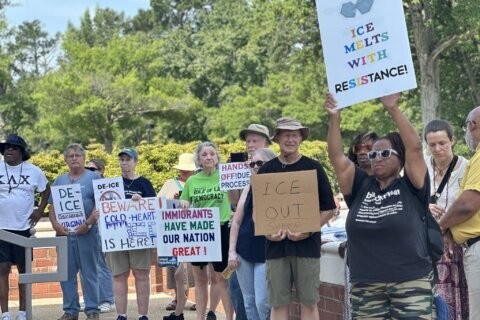This article was republished with permission from WTOP’s news partner InsideNoVa.com. Sign up for InsideNoVa.com’s free email subscription today.
This article was written by WTOP’s news partner InsideNoVa.com and republished with permission. Sign up for InsideNoVa.com’s free email subscription today.
Manassas City Public Schools has received more than $14 million in its first installment of federal money from the American Rescue Plan Act and the 2020 coronavirus relief legislation.
The different pots — nearly $9.8 million from the American Rescue Plan, passed earlier this year, and $4.3 million from the 2020 bill — come with different, though somewhat overlapping constraints. For the larger amount, appropriated from the third COVID relief package signed into law by President Joe Biden in March, 20% of the money must be used to address learning loss that resulted from the COVID-19-affected year.
Manassas, unlike neighboring Prince William County Public Schools, has kept most high schoolers from in-person learning since March 2020.
But the state’s Department of Education is waiting for guidance from the U.S. Department of Education about whether some of the money can be used for capital projects, “including requests to use funds for pre-existing projects and new facilities,” according to the system’s grant award letter from the state.
With a funding plan in place to replace Jennie Dean Elementary, the system’s oldest school building, some School Board members have floated the idea of using ARPA funds to accelerate construction or offset some of the cost of the new building. In theory, the forthcoming federal guidance will make clear whether that would be an acceptable use of some of the money.
The $4.3 million for the division from last December’s relief bill is more strictly limited, to be used for addressing learning loss, facility repairs and improvements aimed at reducing the risk of virus transmission and to improve air quality in school facilities.
Between the money allocated in both bills, Andy Hawkins, chief financial officer for the school division, said the division plans to use over $8 million for teacher and instructional assistant salaries and more than $2.7 million for building upgrades. Meanwhile, $681,502 is allocated for software subscriptions such as Zoom and K-12 Insight.
The additional teacher and assistant pay, along with associated benefits and taxes, will address learning loss due to virtual instruction, Hawkins told the Manassas City Council on Monday night. “This may take the form of after-school remediation, Saturday learning seminars, and/or summer targeted assistance.”
But even though the division plans to use the money as Hawkins laid out to the council, School Board member Tim Demeria — who first proposed the idea of using some of the ARPA funds for the new Dean building — said things could be changed somewhat if the federal guidance comes back saying the construction would be an acceptable use.
If so, Demeria said he would support committing a portion of it to speed up the Dean project.
“It depends on what else has to go away,” Demeria said. “I don’t want to speculate too much; it just depends on what they say we can do where. At that point we’d go back to council and explain what we’re doing.”
Earlier this month, the city’s School Board approved a return plan for the fall that included full in-person learning along with the option for virtual instruction if selected by families.
Director of Student Achievement Melissa Saunders, who next month will be taking over as superintendent of Manassas Park City Schools, said many students will probably have ground to make up, and that a task force of staff members and families had been meeting since February to flesh out a full strategy for the return.
“We do anticipate that some students will have new or widened instructional gaps. The task force focused on math and literacy/English language arts since those skills transcend other areas throughout the student’s school experience,” Saunders said.
A survey will go to families later this month asking about virtual or in-person preferences. Virtual instruction, other than that for special education students, will be provided through Virtual Virginia, the state’s K-12 option. Superintendent Kevin Newman said that would allow teachers to be able to fully focus on students in the classroom.







